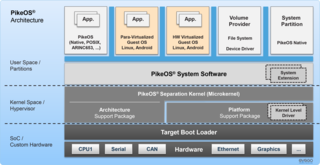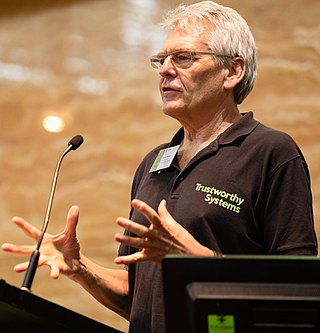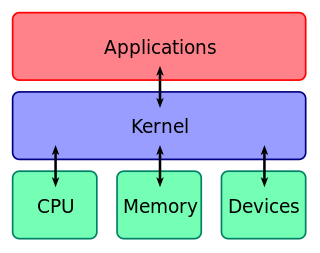
In computing, the Executable and Linkable Format, is a common standard file format for executable files, object code, shared libraries, and core dumps. First published in the specification for the application binary interface (ABI) of the Unix operating system version named System V Release 4 (SVR4), and later in the Tool Interface Standard, it was quickly accepted among different vendors of Unix systems. In 1999, it was chosen as the standard binary file format for Unix and Unix-like systems on x86 processors by the 86open project.

In computer science, a microkernel is the near-minimum amount of software that can provide the mechanisms needed to implement an operating system (OS). These mechanisms include low-level address space management, thread management, and inter-process communication (IPC).
L4 is a family of second-generation microkernels, used to implement a variety of types of operating systems (OS), though mostly for Unix-like, Portable Operating System Interface (POSIX) compliant types.
Versatile Real-Time Executive (VRTX) is a real-time operating system (RTOS) developed and marketed by the company Mentor Graphics. VRTX is suitable for both traditional board-based embedded systems and system on a chip (SoC) architectures. It has been superseded by the Nucleus RTOS.
Enea AB is a global information technology company with its headquarters in Kista, Sweden that provides real-time operating systems and consulting services. Enea, which is an abbreviation of Engmans Elektronik Aktiebolag, also produces the OSE operating system.
A hypervisor is a type of computer software, firmware or hardware that creates and runs virtual machines. A computer on which a hypervisor runs one or more virtual machines is called a host machine, and each virtual machine is called a guest machine. The hypervisor presents the guest operating systems with a virtual operating platform and manages the execution of the guest operating systems. Unlike an emulator, the guest executes most instructions on the native hardware. Multiple instances of a variety of operating systems may share the virtualized hardware resources: for example, Linux, Windows, and macOS instances can all run on a single physical x86 machine. This contrasts with operating-system–level virtualization, where all instances must share a single kernel, though the guest operating systems can differ in user space, such as different Linux distributions with the same kernel.
In computing, paravirtualization or para-virtualization is a virtualization technique that presents a software interface to the virtual machines which is similar, yet not identical, to the underlying hardware–software interface.

Jochen Liedtke was a German computer scientist, noted for his work on microkernel operating systems, especially in creating the L4 microkernel family.

PikeOS is a commercial, hard real-time operating system (RTOS) that offers a separation kernel based hypervisor with multiple logical partition types for many other operating systems (OS), each called a GuestOS, and applications. It enables users to build certifiable smart devices for the Internet of things (IoT) according to the high quality, safety and security standards of different industries. For safety and security, critical real-time applications on controller-based systems without memory management unit (MMU) but with memory protection unit (MPU) PikeOS for MPU is available.

Gernot Heiser is a Scientia Professor and the John Lions Chair for operating systems at UNSW Sydney, where he leads the Trustworthy Systems group (TS).
VirtualLogix, Inc. provides real-time virtualization software and related development tools for embedded systems. The company was founded in 2002. In September 2010, VirtualLogix was acquired by Red Bend Software.
LynxSecure is a least privilege real-time separation kernel hypervisor from Lynx Software Technologies designed for safety and security critical applications found in military, avionic, industrial, and automotive markets.

XtratuM is a bare-metal hypervisor specially designed for embedded real-time systems available for the instruction sets LEON2/3/4, ARM v7 and V8 processors and RISC V processor.

The kernel is a computer program at the core of a computer's operating system and generally has complete control over everything in the system. It is the portion of the operating system code that is always resident in memory and facilitates interactions between hardware and software components. A full kernel controls all hardware resources via device drivers, arbitrates conflicts between processes concerning such resources, and optimizes the utilization of common resources e.g. CPU & cache usage, file systems, and network sockets. On most systems, the kernel is one of the first programs loaded on startup. It handles the rest of startup as well as memory, peripherals, and input/output (I/O) requests from software, translating them into data-processing instructions for the central processing unit.
An embedded hypervisor is a hypervisor that supports the requirements of embedded systems.
The REX Operating System is a real-time operating system (RTOS) developed by Qualcomm for the ARM processor based mobile phone Dual-Mode Subscriber Station (DMSS) or Advanced Mode Subscriber Software (AMSS) development. As of 2007, most Korean cell phones ran on REX.
In computing, Wombat is an operating system, a high-performance virtualised Linux embedded operating system marketed by Open Kernel Labs, a spin-off of National ICT Australia's Embedded, Real Time, Operating System Program.
L4Linux is a variant of the Linux kernel for operating systems, that is altered to the extent that it can run paravirtualized on an L4 microkernel, where the L4Linux kernel runs a service. L4Linux is not a fork but a variant and is binary compatible with the Linux x86 kernel, thus it can replace the Linux kernel of any Linux distribution.

Genode is a free and open-source software operating system (OS) framework consisting of a microkernel abstraction layer and a set of user space components. The framework is notable as one of the few open-source operating systems not derived from a proprietary OS, such as Unix. The characteristic design philosophy is that a small trusted computing base is of primary concern in a security-oriented OS.








